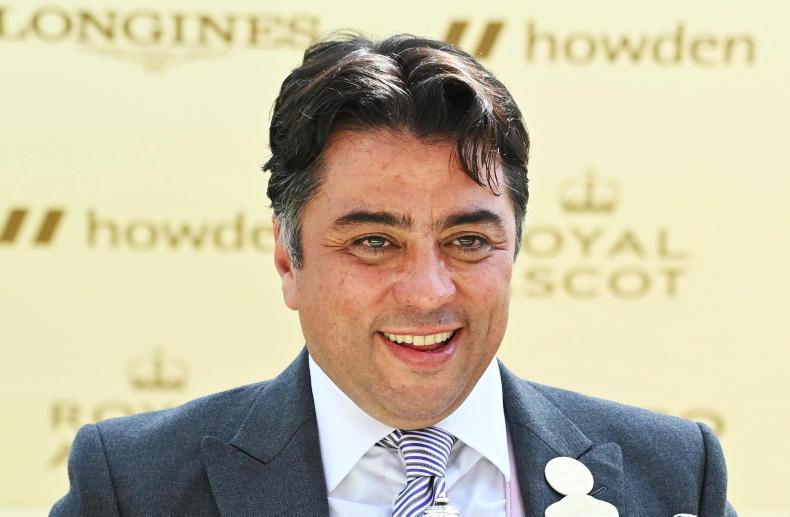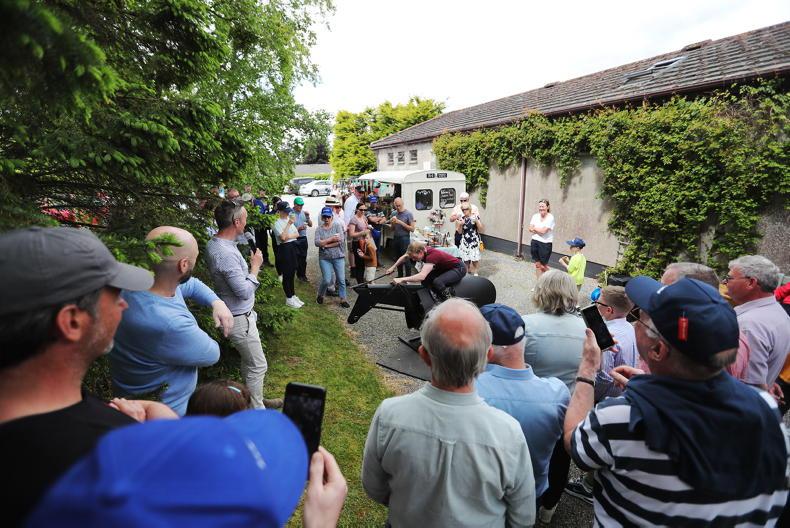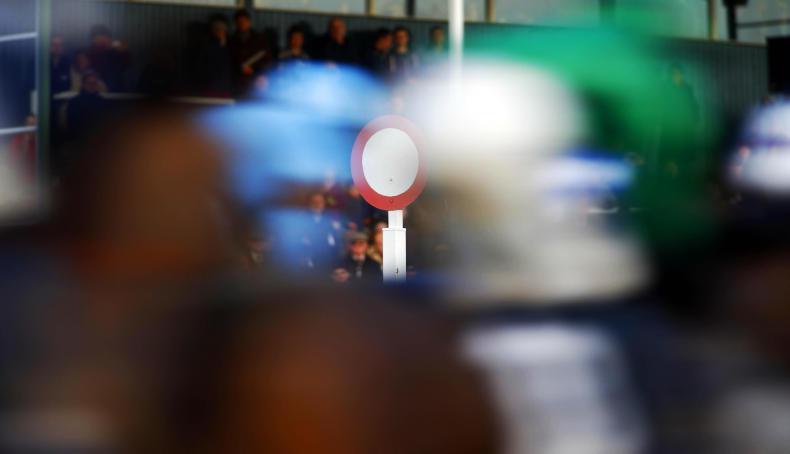Q: Which of the two jobs was more stressful – training horses or running the trainers’ association?
MG: Training was more stressful. I suppose it has so many ups and downs, you know. There’s always more disappointments than there are good days. But I loved the training, I did it for 35 years.
It started when Paddy Kearns died and his wife asked me to take over the stable. He had been training mainly for the McGrath family. I hadn’t intended to start because I was going to wait until my father [Christy] retired and then I would take over. But Dad said to me ‘you have 26 horses here - it a great opportunity’.
Q: Where was that?
MG: In Castleknock, just outside the Phoenix Park. All the owners said they would leave the horses with me but, a week later, there was a big exodus and I was left with three horses. My father sent me three more. I had two lads and after we rode out our six we spent the rest of the morning working for my father. That was 1977 and that was the start of it.
Q: How long were you there?
MG: In 1979 the Pope came to the Phoenix Park and, after that, they wouldn’t allow us back in to maintain the gallops. The Board of Works said we were denying their men the work. Jim Bolger was there, Hugh Nugent, the Kerrs, Eddie Lynam was just starting. There were loads of people training in the Park, and Ted Walsh’s father Ruby used to use those gallops too, but they literally stopped us.
The Gallaghers (property developers) had horses with Dad at the time and we were using their fields for one or two years but, eventually in the early ‘80s we had to move to the Curragh. I rented for a number of years - Frank Berry’s place now, and then with Declan Gillespie. At this stage I had a good few horses so I had to build. In 1990 I bought this 16-acre site (Fenpark, just behind Dermot Weld’s yard on the Pollardstown road) and built the yard.
Q: Were there any horses in particular that put you on the map?
MG: Dochas was probably one of my best horses at that time. He was the best three-year-old hurdler of that year. My father advised me not to go for the Triumph Hurdle and wait for Aintree but I was carried away by the fact he was favourite for Cheltenham. He ran well there but didn’t stay the trip. He had been a miler on the flat.
Q: Were you making a decent living at that time?
MG: The first couple of years were difficult until I started to build up the numbers. My late brother Brian, he was a great support. He found a lot of foreign owners for me. I had owners from America, Australia, France and Spain. I trained one for President Mary Robinson named Ridge Pool. She was good but broke her pelvis coming out of stalls. She went on to be the dam of Caumshinaun, who in turn bred Nightime, the Irish 1000 Guineas winner for Mrs Weld and dam of Ghaiyyath.
Q: You always seemed to be well-supported by owner-breeders?
MG: Yes, Pat O’Kelly and Sonia Rogers were great supporters. I had horses for Bernie Cooke, Stephanie von Schilcher. I trained Preseli to win the Moyglare Stud Stakes for a Welsh-American, Neil Jones. And San Sebastian won twice for me at Royal Ascot and was beaten by a neck in the Prix du Cadran.
Q: What led to you moving out of training?
MG: The recession. I had a lot of very good owners and was always careful about who I trained for. My father had always warned me about avoiding bad payers. But a few of my clients went broke overnight around 2008. Then very sadly my brother Brian died in 2009, so the flow of horses from that source was gone. Some owner-breeders like Joe Higgins were cutting back.
So, I couldn’t see myself getting back to where I was. I always felt I had to have 35 horses in training to make it pay. You need that number to pay for the part-time secretary, the box driver, the tractors and trailers, and to keep the gallops maintained.
I couldn’t see it getting any better in the short term.
Q: And then the job of chief executive of the trainers’ association came along at the right time?
MG: I thought it was an ideal opportunity. I’d always had an interest in the association. I had been chairman for three years from 2002 to 2005 and I had been on the committee. I actually enjoyed my time as CEO.
Q: Most readers wouldn’t know what the job entails. What does it typically involve?
MG: Well, it’s dealing with the problems trainers are having on a day-to-day basis. Maybe they feel they have been unfairly fined or they can’t find a race for one of their horses. Basically they called me if they need information that they can’t get.
I had a very good working relationship with Shane Doyle in Horse Racing Ireland’s racing department. He works with [Director of Racing] Jason Morris. I would bring it Shane’s attention that there’s a shortage of a particular type of race and, in fairness, they always did their very best. They would divide a race or add a race if they could.
We didn’t always get what we asked for. We might agree at a trainers’ meeting that something needed to be changed. I would make representations but, for example, the Turf Club or IHRB might not agree with us. Trainers might see that nothing has happened and think we didn’t do our job but we always put their case forward.
Q: Is it fair to say that relations between the trainers and the Turf Club/IHRB have always been strained? What sort of things angered you about them?
MG: The fines, particularly on the smaller trainers. For instance if your horsebox breaks down you are automatically fined €200. So you have to appeal it, provide proof from the garage that your vehicle broke down or had a puncture.
Another example was last year when, I think, there were four trainers fined for taking their horses out at Wexford. They withdrew their horses when the ground changed and they did it early enough to allow reserves to run. But then the ground changed back to what it had been and the stewards fined them! I had to appeal that on their behalf and they got their money back.
The other day a small trainer was fined €2,000 over the presence of Gastroguard, an ulcer remedy, in a horse he ran at a barrier trial. Now I know they say that barrier trials are run under racing conditions but the fact is that you can carry any weight you like and you can just have a spin out the back, so it is not the same as a race. That offence deserved no more than a rap on the knuckles but the stewards said they had to get tough on the use of drugs in racing!
Some of these cases and appeals are taking far too long to be dealt with. The IHRB used to use an outside legal firm but now they have three solicitors of their own and it’s actually taking longer. You could have a maiden winner that you know is facing disqualification but you could be waiting a year or more before you can run it in another maiden.
Q: Did the number of trainers holding a licence decrease by much during your time in office?
MG: No, I think the numbers have more or less been stable. There’s roughly 350 licensed trainers. The number of restricted trainers dropped to below 200 at one stage but I believe it’s back up to 225.
Q: But it’s clear that the bigger trainers are winning more races than before, so it stands to reason that there must be less to share out among everyone else?
MG: What has happened - and I suppose I was in that position – is that a lot of those trainers who were in middle tier with between 50 and 70 horses are now down to 20 or 25 horses. And the lads with 100 horses now have 200 or more. Owners are gravitating to where they feel they can have success. It is terrible to see the balance shift so much in favour of the bigger yards. I don’t think anything can be done about that.
Q: What about staff shortages? Is it because of pay rates or the long hours?
MG: The biggest problem is trainers not charging enough in fees. If you are not charging enough you can’t pay enough. Some small trainers are only charging €35-€40 per day. The minimum should be €50 or even higher.
Having said that, I have been on the panel for the industry employee awards for the past number of years. I always ask the finalists what improvements they would like to see. It’s not wages, it’s more time off. Wages are important, don’t get me wrong. But if you want to give staff more time off, you need more staff and that’s why you need to charge enough in fees.
Even trainers need more time off at weekends, to be with their families. I’d like to see probably less racing on a Sunday.
Q: Your son Michael is training now and has just had a very good season. Did you try to put him off getting a licence?
MG: Originally I thought Michael was going to go into the breeding end of it. But when I was in two minds whether I was going to continue or not, he said that he would like to take up the training. So I literally just stepped out and he stepped in. But he’s been lucky in that he’s had the yard and he’s had everything there for him. There’s no way that he could have set up on his own, you know what I mean, to put all the money into it, buying equipment, saddles, gear, everything.
Q: Would you say that pre-training is probably an easier job to do?
MG: You see, I think the pre-training has damaged a lot of trainers. If you are missing the horses for three, four or five months then it’s very difficult to keep staff.
Q: The IHRB has stepped up the number of inspections it is carrying out. How is that going down with trainers?
MG: I actually only had one inspection in my 35 years. Trainers never had a problem with the stable inspections. Now the IHRB has authorised officers who can inspect stud farms and everything like that. To me, that is a job for the Department of Agriculture. The IHRB are just bringing an additional expense on to racing.
Earlier this year a trainer in Northern Ireland phoned me to say his yard had just been ‘raided’ by authorised officers. He wondered if they had jurisdiction in the north. I checked it out and they didn’t.
Q: The IHRB has a new chief executive. Have you met him and would you be hopeful that things will improve?
MG: I’ve met him and, while you’d always be hopeful, history has shown that those who come into senior positions in the industry with no prior experience of racing don’t always do well. It didn’t work at the Curragh.
Q: In early 2020 the trainers’ association was involved in a two-month High Court case against Chris Gordon, a racing official. The trainers lost the case and I understand there is an appeal ongoing. What was that experience like for you?
MG: We were told the case would only last seven or eight days, not seven or eight weeks. It was very stressful on me personally and on my family. Covid came in during the middle of the case. It was difficult because I was the last person in the witness box. I was cross-examined for three days. I can tell you I wouldn’t like to be doing that again. Yes, an appeal went in and we are still waiting for a result.
Q: Is the trainers’ association truly representative of all trainers or is it skewed towards the top end?
MG: Well, we’ve a mixed committee. Aidan and Joseph O’Brien are on it, Gordon Elliott and Gavin Cromwell are on it. Then you have Eoin Griffin, Sarah Dawson, Eugene O’Sullivan, Ross O’Sullivan, Donal Kinsella, Jim Gorman and Ado McGuinness is the chairman. So, to me, we’ve always had a very good mix of the large, medium and smaller yards. Everybody’s interests are brought to the table and we do our best for everybody.
Q: Is there any one thing that trainers are looking for at the moment that is high on the agenda?
MG: Well, one thing that I tried to bring in a couple of years ago, and nearly got there, is appearance money for runners. One day at Thurles I worked out that 72% of the trainers with runners won nothing. Everyone else on the track was getting paid for being there.
Q: But what about the training fees?
MG: The way the training fees have gone after the recession, they go nowhere near what you need. Even if you win prize money, you don’t get 10%. It’s closer to 7% after deductions. We should get an allowance for having runners, just to cover the diesel or whatever. Ironically it was the owners who objected to it!
Q: Finally, what are your plans for the future?
MG: I am the maintenance man around here now. I give Michael a hand but he makes all the decisions. I’m looking forward to spending more time with Miriam, our daughter Sarah, and our grandchildren. I’ve had a great career in racing and made a lot of friends. I’d like to thank everyone for their kind wishes on my retirement.
Second all-weather track?
I always felt Dundalk was built in the wrong place. The all-weather should have been in Naas, or should have been more centralised. There probably is a need for a second one but I’ll be disappointed to lose the turf sprint track at Tipperary. When the second all-weather opens, I expect Dundalk will lose half of its fixtures because I can’t see how the current horse population can fill another 40 meetings. A lot of them will have to come from Dundalk.
48-hour declarations
I didn’t agree with them but they are here to stay. They are fine for Dundalk but when you have to take ground variations into account it ends up with owners having to pay more in entry and declaration fees.
Horse welfare
There’s a lot more money going into welfare, which is a good thing. But I don’t agree with changing racing to appease non-racing people. The more you give in, the more they will keep at it and at it, until racing is stopped. Britain is heading that way. The whip will be gone, then jump racing will be next, then all racing. We need to stand our ground and stand up for our sport and say “the way the horses are looked after, both in Ireland and Britain, is second to none.”


 This is a subscriber-only article
This is a subscriber-only article
 It looks like you're browsing in private mode
It looks like you're browsing in private mode












SHARING OPTIONS: